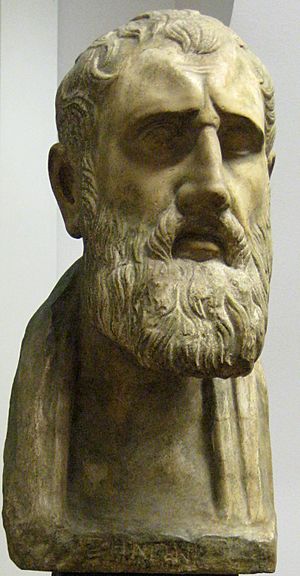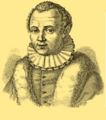Natural law facts for kids

Natural law is the idea that some rules or laws exist naturally. They are true for everyone, everywhere, and at all times. These laws are not made by people or governments. Instead, they are believed to be part of nature itself.
Think of it like this: some things are just right or wrong, no matter what society says. These are often called natural rights. Today, many people see human rights as coming from this idea of natural law. This way of thinking started a very long time ago, even in Ancient Greece.
Contents
What is Natural Law?
Natural law is different from "positive laws." Positive laws are rules that people create, like traffic laws or laws about taxes. These laws can change from place to place or over time. Natural law, however, is thought to be unchanging and universal. It applies to everyone, always.
For example, the idea that it's wrong to harm innocent people might be seen as a natural law. It's not just a rule a government made up. It feels like a basic truth about how humans should behave.
Where Does Natural Law Come From?
People have different ideas about where natural law comes from. Some common ideas include:
- God: Many believe that a higher power or God created these natural laws when the world was made.
- Reason: Others think that humans can discover these laws using their own reason and logic.
- Nature: Some believe that natural laws are simply part of how the world works, like the laws of physics.
- Conscience: The inner feeling of right and wrong that people have, often called conscience, is also seen as a source.
Who Developed These Ideas?
Many important thinkers throughout history have talked about natural law. They helped shape how we understand it today.
Ancient Greek Thinkers
The idea of natural law began with philosophers in Ancient Greece.
- Aristotle: He believed that everything in nature has a purpose. He thought that humans could find out what is right by understanding their natural purpose.
- Plato: He also explored ideas of universal truths and justice that exist beyond human rules.
Roman and Medieval Thinkers
Later, Roman thinkers and medieval philosophers continued to develop these ideas.
- Seneca the Younger: A Roman Stoic, he believed in living in harmony with nature and reason.
- Thomas Aquinas: A very important philosopher in the Middle Ages, he combined Christian beliefs with Aristotle's ideas. He taught that natural law is part of God's eternal law, which humans can understand through reason.
Modern Ideas
Even in more recent times, philosophers have discussed natural law.
- Immanuel Kant: He focused on the idea that moral laws come from reason itself, and that people should act in ways that could become universal rules.
Related Ideas
- Constitution: A set of basic rules for a country, often reflecting ideas of rights and justice.
- Jurisprudence: The study and theory of law.
Images for kids
-
Plato (left) and Aristotle (right), two very important ancient Greek philosophers. This is a detail from a famous painting called The School of Athens.
-
Marcus Tullius Cicero was a famous Roman lawyer and philosopher.
-
Alberico Gentili is known as one of the founders of international law, which deals with rules between countries.
See also
 In Spanish: Derecho natural para niños
In Spanish: Derecho natural para niños
 | Isaac Myers |
 | D. Hamilton Jackson |
 | A. Philip Randolph |





